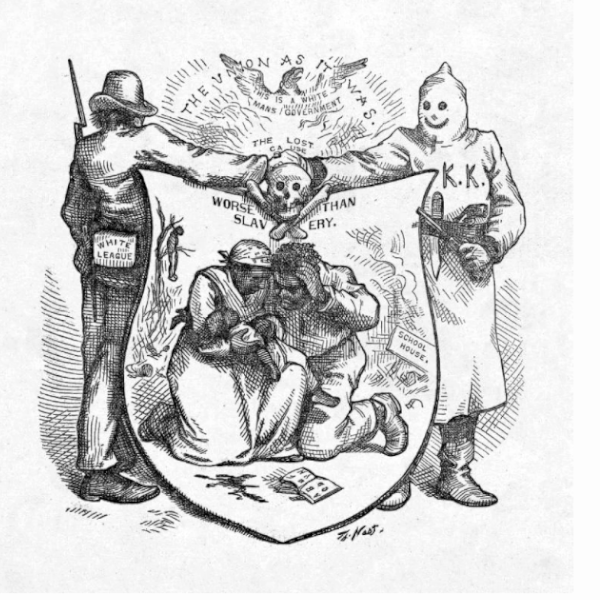
The Joint Committee on Reconstruction, was made up of nine Representatives and six Senators. It conducted hearings and grappled with the constitutional questions that followed emancipation, such as defining citizenship and preventing southern governments from excluding potential Black voters while benefiting from their inclusion in population totals used to formulate congressional apportionment.
The arrival of Senator Hiram Revels of Mississippi and Representative Joseph Rainey of South Carolina on Capitol Hill in 1870, ranks among the great paradoxes in American history; just a decade earlier, their congressional seats were held by southern slave owners. From participation in the federal legislature to their struggle to attain full civil rights, African-American representation in Congress has undergone extensive changes. During the last century, Black Members have overcome many barriers to make historic gains in both the House and the Senate.
My race needs no special defense, for the past history of them in this country proves them to be equal of any people anywhere. All they need is an equal chance in the battle of life.
—Representative Robert Smalls of South Carolina
The caucus is officially non-partisan; but, in practice, the vast majority of African Americans elected to Congress since the CBC's founding have been Democrats. Ten African American Republicans have been elected to Congress since the caucus was founded in 1971. Of these ten, only Evans, Franks, West, and Love joined the CBC.
Review a brief synopsis of Black Americans who have served in Congress. Joseph Rainey, William Dawson, and Gus Hawkins are a few of the African-American Members who made history in the House.
First Black American to serve in Congress
Hiram Revels of Mississippi began his service in the U.S. Senate when he was sworn in on February 25, 1870.
First African-American Representative elected to Congress
Joseph Rainey of South Carolina began his service in the House of Representatives when he was sworn in on December 12, 1870.
First African-American Representative to speak on the House Floor
Jefferson Long of Georgia spoke on the House Floor in 1871.
First African-American Representative to preside over a House session
Joseph Rainey of South Carolina presided over the House in 1874.
First African American to chair a congressional committee
Blanche Bruce of Mississippi became chairman of Senate Select Committee on the Mississippi River in 1877.
First African American to chair a standing congressional committee
William Dawson of Illinois became chairman of the Expenditures in the Executive Departments Committee (later named Government Operations) in 1949.
First African American popularly elected to the Senate
Edward Brooke of Massachusetts was elected to the Senate in 1966.
First Black-American woman elected to Congress
Shirley Chisholm of New York was elected to the House of Representatives in 1968.
First Black-American woman elected to the Senate
Carol Moseley-Braun of Illinois was elected to the Senate in 1992.
Cardiss Collins, Yvonne Brathwaite Burke, and Shirley ChisholmView Larger
Image courtesy of Moorland–Spingarn Research Center, Howard University More women joined the first black Congresswoman, Shirley Chisholm of New York, on Capitol Hill during this period. Pictured from left to right are: Cardiss Collins of Illinois, Yvonne Brathwaite Burke of California, and Chisholm. In the 110th Congress (2007–2009), women account for one-third of the total number of African-American Members.
First African-American Member whose child succeeded him in Congress
Harold Ford, Sr.’s son Harold Ford, Jr. was elected to his father’s Memphis, Tennessee, seat upon his retirement in 1996.
Most committees chaired by an African-American Member of Congress
Gus Hawkins of California holds the distinction of the most committees chaired by an African-American Member (four).
Longest congressional tenure for a black Member of Congress
Elected to the House in 1964, John Conyers of Michigan has the longest congressional tenure for a black Member of Congress.
State with the most African-American Members of Congress
Historically, Illinois has had the most African-American Members of Congress.
Ask students to locate three Weekly Historical Highlights dates that focus on Black Americans who served in Congress. Use Black Americans in Congress to research more about each of these Members.
Begin a class discussion with Representative Gus Hawkins’s quote, “The leadership belongs not to the loudest, not to those who beat the drums or blow the trumpets, but to those who day in and day out, in all seasons, work for the practical realization of a better world—those who have the stamina to persist and remain dedicated.” Ask students to think about the meaning of the quote, the possible context, and how the statement may have been related to the experience of the early African-American Members who served in Congress. Have students compile a list of traits they believe a leader should possess and start a class discussion about the different types of leaders.
Ask students to choose one former African-American Member of Congress. Have students create a list of biographical and legislative information about this Member, as well as any other distinctive or unique aspects to his/her career. Organize a mock press conference in which each person answers questions about his/her Member and shares important highlights with the rest of the class.